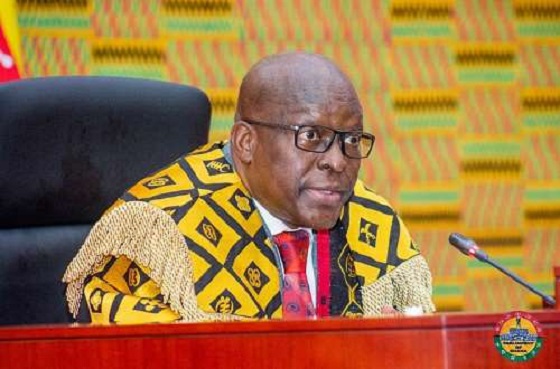Alban Bagbin
Members of the Majority Caucus have triggered a process to demand recall of Parliament after the Speaker adjourned the House sine die on March 20, 2024.
Majority Leader, Alexander Afenyo-Markin, told the media yesterday in Parliament that the caucus members had no choice but to assert their right under Article 112(3) of the Constitution.
Article 112(3) says, “Notwithstanding any other provision of this Article, fifteen percent of Members of Parliament may request a meeting of Parliament, and the Speaker shall, within seven days after the receipt of the request, summon Parliament.”
“We are invoking our right under the law in good faith. As far back as April 8, 2024, I, on behalf of colleagues, sent a memo to Mr. Speaker.
“In that memo, my humble prayer to Mr. Speaker was for him to exercise his discretion under the powers given him under Orders 58 and 59 of the Standing Orders of Parliament,” he stated.
The Majority Leader indicated that unfortunately, his prayer was not successful, leaving them with no option than to invoke their right under the law.
This constitutional imperative has also found space in the new Standing Orders of Parliament, Order 53.
Mr. Afenyo-Markin said, “So we are fortified by law to proceed with our prayer. Therefore, in terms of these, we have initiated the process to trigger this and we do so in good faith and for the good of our democracy.”
According to him, they are aware members of the Minority Caucus do not agree with them on the call for a recall, pointing out, “We can’t take those views away from them. After all, we are not the same.”
“We are two political parties competing for power.
They have their ideological views and we have ours. I will not fault them, if on this occasion they disagree with us.
“In any event, we work together and in politics expect disagreement. But such disagreements should not obstruct us. We have our 138 as a majority and should be able to carry government business,” he asserted.
Explaining why Parliament should be recalled, Mr. Afenyo-Markin said at the time the House adjourned sine die, there were three items of urgent importance to government that had been advertised to be taken.
He mentioned the Adoption of the 34th Report of the Appointment Committee on the President’s nomination for appointment as Ministers, Regional Ministers and Deputy Ministers, motion on additional financing agreement between the Government of Ghana and IDF for an amount of $150 million to finance the ongoing Greater Accra Resilient and Integrated Development (GARID) Project, and a request for tax exemptions for beneficiaries under the One District One Factory (1D1F) programme.
Regarding the President’s nomination, the Majority Leader stated that the House had reached a consensus to adopt the report and that voting on the motion was the only thing remaining to do.
On the $150 million for the GARID project, he stated that the Finance Committee had completed its work and the House had passed the motion on the report; however, the Works and Housing Committee had expressed some opinions, and the Speaker had recommended that the matter be referred back to the committee so that the committee’s leadership could incorporate their views into the report.
“This was done and all that was left is for this item to be taken so that the government can access the concessional facility to shore up our forex,” he added.
On the issue of the tax exemption, Mr. Afenyo-Markin explained that it was good for the country to give the tax incentives to the private sector to create jobs for the teeming youth.
“We are all aware that unemployment is a major issue in this country. Job creation can never be guaranteed in the public sector.
“If we over-rely on the public sector for job creation, our economy will crash. There is going to be consumption throughout without any investment,” he stated.
He continued, “You may recall that somewhere in 2013, the then President, John Dramani Mahama lamented how we were spending all our tax revenues on public sector wages.”
“This government came out with a paradigm shift to encourage the private sector to create employment and that is how the 1D1F policy was introduced.
“We have a number of companies who got attracted by this and have started building factories in Ghana. They have gotten into various stages and there is an urgent need to have these tax exemptions in place for them.
“It is not a freebie or a waste of money. It is rather giving money to the private sector to grow,” he explained.
He stated further, “When you introduce such incentives, it is also to enhance production and create the necessary space in the liquidity of the companies so that they can employ more and expand.”
By Ernest Kofi Adu


